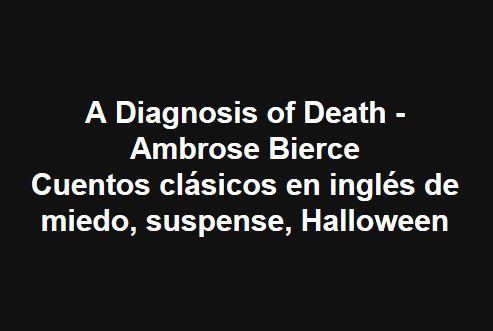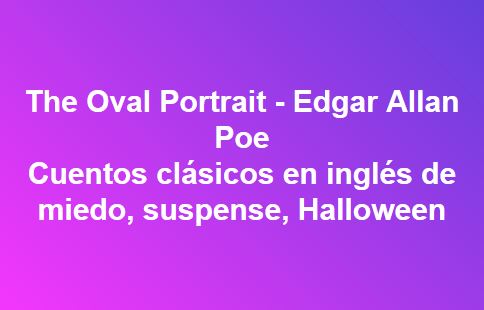
Recursos Educativos en Inglés - Stories in English
Cuentos clásicos en inglés de miedo, suspense, halloween
A Diagnosis of Death - Ambrose Bierce - Horror
'I am not so superstitious as some of your physicians - men of science, as you are pleased to be called,' said Hawver, replying to an accusation that had not been made. 'Some of you - only a few, I confess - believe in the immortality of the soul, and in apparitions which you have not the honesty to call ghosts. I go no further than a conviction that the living are sometimes seen where they are not, but have been - where they have lived so long, perhaps so intensely, as to have left their impress on everything about them. I know, indeed, that one's environment may be so affected by one's personality as to yield, long afterward, an image of one's self to the eyes of another. Doubtless the impressing personality has to be the right kind of personality as the perceiving eyes have to be the right kind of eyes - mine, for example.'
'Yes, the right kind of eyes, conveying sensations to the wrong kind of brains,' said Dr. Frayley, smiling.
'Thank you; one likes to have an expectation gratified; that is about the reply that I supposed you would have the civility to make.'
'Pardon me. But you say that you know. That is a good deal to say, don't you think? Perhaps you will not mind the trouble of saying how you learned.'
'You will call it an hallucination,' Hawver said, 'but that does not matter.' And he told the story.
'Last summer I went, as you know, to pass the hot weather term in the town of Meridian. The relative at whose house I had intended to stay was ill, so I sought other quarters. After some difficulty I succeeded in renting a vacant dwelling that had been occupied by an eccentric doctor of the name of Mannering, who had gone away years before, no one knew where, not even his agent. He had built the house himself and had lived in it with an old servant for about ten years. His practice, never very extensive, had after a few years been given up entirely. Not only so, but he had withdrawn himself almost altogether from social life and become a recluse. I was told by the village doctor, about the only person with whom he held any relations, that during his retirement he had devoted himself to a single line of study, the result of which he had expounded in a book that did not commend itself to the approval of his professional brethren, who, indeed, considered him not entirely sane. I have not seen the book and cannot now recall the title of it, but I am told that it expounded a rather startling theory. He held that it was possible in the case of many a person in good health to forecast his death with precision, several months in advance of the event. The limit, I think, was eighteen months. There were local tales of his having exerted his powers of prognosis, or perhaps you would say diagnosis; and it was said that in every instance the person whose friends he had warned had died suddenly at the appointed time, and from no assignable cause. All this, however, has nothing to do with what I have to tell; I thought it might amuse a physician.
'The house was furnished, just as he had lived in it. It was a rather gloomy dwelling for one who was neither a recluse nor a student, and I think it gave something of its character to me - perhaps some of its former occupant's character; for always I felt in it a certain melancholy that was not in my natural disposition, nor, I think, due to loneliness. I had no servants that slept in the house, but I have always been, as you know, rather fond of my own society, being much addicted to reading, though little to study. Whatever was the cause, the effect was dejection and a sense of impending evil; this was especially so in Dr. Mannering's study, although that room was the lightest and most airy in the house. The doctor's life-size portrait in oil hung in that room, and seemed completely to dominate it. There was nothing unusual in the picture; the man was evidently rather good looking, about fifty years old, with iron-grey hair, a smooth-shaven face and dark, serious eyes. Something in the picture always drew and held my attention. The man's appearance became familiar to me, and rather "haunted" me.
'One evening I was passing through this room to my bedroom, with a lamp - there is no gas in Meridian. I stopped as usual before the portrait, which seemed in the lamplight to have a new expression, not easily named, but distinctly uncanny. It interested but did not disturb me. I moved the lamp from one side to the other and observed the effects of the altered light. While so engaged I felt an impulse to turn round. As I did so I saw a man moving across the room directly toward me! As soon as he came near enough for the lamplight to illuminate the face I saw that it was Dr. Mannering himself; it was as if the portrait were walking!
'"I beg your pardon," I said, somewhat coldly, "but if you knocked I did not hear."
'He passed me, within an arm's length, lifted his right forefinger, as in warning, and without a word went on out of the room, though I observed his exit no more than I had observed his entrance.
'Of course, I need not tell you that this was what you will call a hallucination and I call an apparition. That room had only two doors, of which one was locked; the other led into a bedroom, from which there was no exit. My feeling on realizing this is not an important part of the incident.
'Doubtless this seems to you a very commonplace "ghost story" - one constructed on the regular lines laid down by the old masters of the art. If that were so I should not have related it, even if it were true. The man was not dead; I met him to-day in Union Street. He passed me in a crowd.'
Hawver had finished his story and both men were silent. Dr. Frayley absently drummed on the table with his fingers.
'Did he say anything to-day?' he asked - 'anything from which you inferred that he was not dead?'
Hawver stared and did not reply.
'Perhaps,' continued Frayley,' he made a sign, a gesture - lifted a finger, as in warning. It's a trick he had - a habit when saying something serious - announcing the result of a diagnosis, for example.'
'Yes, he did - just as his apparition had done. But, good God! did you ever know him?'
Hawver was apparently growing nervous.
'I knew him. I have read his book, as will every physician some day. It is one of the most striking and important of the century's contributions to medical science. Yes, I knew him; I attended him in an illness three years ago. He died.'
Hawver sprang from his chair, manifestly disturbed. He strode forward and back across the room; then approached his friend, and in a voice not altogether steady, said: 'Doctor, have you anything to say to me - as a physician? '
'No, Hawver; you are the healthiest man I ever knew. As a friend I advise you to go to your room. You play the violin like an angel. Play it; play something light and lively. Get this cursed bad business off your mind.'
The next day Hawver was found dead in his room, the violin at his neck, the bow upon the string, his music open before him at Chopin's Funeral March.
🔆 Otros cuentos:
Adblock test (Why?)








